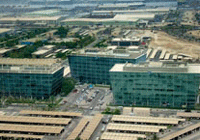
Jafza sukuk tempts despite high leverage
Dubai, June 14, 2012
An oversubscribed sukuk from state-owned Jebel Ali Free Zone (Jafza), sold on Tuesday, looks set to continue attracting demand in the secondary market, where it has already been bid higher post-issue.
Jafza, an industrial park on the outskirts of Dubai and part of state-owned conglomerate Dubai World, priced its $650 million, seven-year sukuk at 7.00 percent, at the tighter end of guidance, with an order book that was more than three times oversubscribed.
The company will use proceeds from the issue plus a $1.2 billion Islamic financing facility to repay a $2 billion-equivalent sukuk maturing later this year, which was previously seen as one of corporate Dubai's most difficult debt maturities of 2012. The rest of the maturing sukuk will be repaid with internal cash resources.
The new sukuk, issued at par, was trading at 101 levels on Wednesday, according to two Dubai-based traders. "When all is said and done, the deal will do well and will probably trade up on the secondary and with it lift the rest of the GREs (government-related enterprises)," Ahmed Alanani, senior executive officer at investment bank Exotix, said in a note on Tuesday.
Compared to Dubai Holding Commercial Operations Group's (DHCOG) 500 million sterling-denominated bond, maturing 2017 with a coupon of 6 percent and now yielding over 10 percent, Jafza did not pay a generous premium for its issue. Both bonds are rated B2 by Moody's and fully government-owned.
However, DHCOG's yield needs to account for currency risk and an illiquidity premium. Although both credits are exposed to Dubai's real estate market, JAFZA's strategic importance to the state's infrastructure scores it above DHCOG.
Another Dubai Inc credit, state monopoly Dubai Electricity and Water Authority (Dewa), rated a few notches above Jafza at BBB-, has seen yields on its outstanding 2020 maturity tighten in recent weeks.
Some bankers still consider the $1.5 billion, 6.375 percent bond cheap at current levels of 106 cents on the dollar to yield 6.43 percent. Yields have tightened about 20 basis points since June 5, when Jafza's new issue was announced.
Other factors are attractive in the Jafza sukuk. The deal's size of $650 million means limited supply, while the company is seen by many investors as strategically important to Dubai's economic recovery.
"Jafz's baseline credit assessment continues to rely on its inherently strong business model, which in turn rests on a large pool of rental contracts with diversified tenants that exhibit high occupancy levels and, to date, low churn rates," Moody's said earlier this month.
Furthermore, a general improvement in investor sentiment towards Dubai over the last several months, thanks to its progress in restructuring corporate debt and its image as a safe haven amid regional instability, are helping Jafza.
"Jafz is statement of trust and confidence in Dubai. The paper will eventually settle in the region of 6.60-6.75 percent," said Sufyan Sadiq, capital markets manager at Commercial Bank International in Dubai.
Dubai's five-year credit default swaps, the cost of insuring against a sovereign default, were bid at 360 bps on Wednesday, 33 bps tighter since the beginning of this month and over 80 bps tighter since the start of this year - a particularly impressive performance during a global financial crisis.
Alanani said the company's problems, especially the fact that it remained highly leveraged, would continue to weigh on credit quality.
Jafza's leverage post-refinancing will stand at an elevated six times earnings before interest, taxes, depreciation, and amortisation (EBITDA), which is not a meaningful reduction from the current 6.5 times, Exotix said. Its interest burden is expected to remain high for the next seven years.
"Once the euphoria dies down and reality sets in, we will all realise that little has fundamentally changed with this credit and management have their job cut out for them in the coming years," Alanani said.
Many local investors, however, do not attach much weight to the leveraging figures because they do not see Jafza as a standalone credit. Instead, they think it enjoys the implicit backing of the Dubai government, which appears ready to do what it is necessary to prevent any corporate bond defaults that could destabilise markets.
The perception of a close link between Jafza and the government can be seen in the performance of Dubai's 4.9 percent, $600 million 2017 sovereign sukuk. It was yielding 4.25 percent on Wednesday, having widened about 6 bps since Jafza set its price guidance on June 11.
At a z-spread of 546 bps, the Jafza sukuk offers approximately 190 bps of pick-up over the interpolated spread curve of Dubai government sukuk, said Zafar Nazim of J.P. Morgan Securities.
"We believe that fair value for this instrument is 30-40 bps tighter at a yield of 6.4-6.5 percent," he said.
In the short term, the new Jafza sukuk may get a liquidity boost in the secondary market from the fact that several regional sukuk are being repaid in the current period. DIFC Investments repaid its $1.25 billion sukuk on Wednesday, having secured funding to refinance it in early June; Emirates airline will repay a $550 million sukuk due June 16. Repayment of JAFZA's old sukuk next week, earlier than the original November maturity date, will also free up liquidity.
"Local investors tend to have a home bias in their investment allocations, so I would expect much of the funds from maturing bonds that they hold to be reinvested into local fixed income," Nick Stadtmiller, head of fixed income research at Emirates NBD, said late last month.
"Given the already strong demand for sukuk, the additional money from maturing paper may give sukuk a boost in the secondary market." - Reuters







